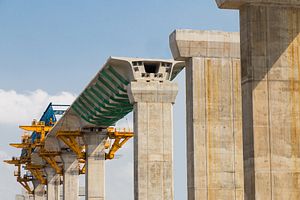On October 24, 2014, 21 Asian nations signed on to establish the Asian Infrastructure Investment Bank (AIIB). The bank is led and – for now at least – primarily funded by China, and is intended to provide loans for building infrastructure (from roads to mobile phone towers) in under-developed parts of Asia.
For a long time, observers expected AIIB to be a competitor to the Asian Development Bank (ADB), the more established bank primarily backed by the U.S. and Japan. The banks would not “compete” in economic terms, as neither of them alone or even working together could finance all of Asia’s infrastructure needs, but there is a sense that the AIIB’s lower standards could undercut local goals that ADB’s more stringent conditions promote. However, on Wednesday, ADB President Takehiko Nakao said that ADB is willing to co-finance projects with AIIB if the latter meets the former’s standards for loans.
The official reason China created the AIIB is because of the massive funding gap for infrastructure projects in Asia. ADB estimates that the gap to be $8 trillion between 2010 and 2020. The ADB has a capital base of around $160 billion and the World Bank $223 billion. AIIB’s starting capital of $50 billion will not solve all the problems, but will be a help make a difference. AIIB will exclusively focus on infrastructure, while ADB and World Bank loans have a wider range of projects, such as those that support environmental protection and gender equality.
Japan and the ADB’s primary stated concerns about AIIB have to do with governance and transparency issues. Jin Liqun, the Chinese official heading the bank, fended off criticisms about AIIB’s expected-to-be-lenient environmental, labor, and procurement standards, saying that AIIB will adopt best practices of more established institutions, such as the World Bank.
Unstated concerns have more to do with fears of Japan and the ADB losing influence. Japan does not want to lose its privileged ability to write the so-called “rules of the road.” All of the ADB’s presidents have been Japanese, and Japan’s voting share in the ADB is twice that of China. The real competition between Japan and China would not be over funding projects per se, but over who gets to set the regional standard for what requirements must be met to receive funding.
Mixed messages are coming out of Beijing about the kinds of rules we can expect from the AIIB. On Saturday, Chinese Finance Minister Lou Jiwei was quoted by Chinese media sources as saying the AIIB would complement other international financing institutions and help “more vigorously push forward the global economy.” Yet on Sunday, Nikkei Asian Review reported his comments that Western rules are not necessarily the best ones.
Considering all this, the possibility of joint financing between AIIB and ADB is a major development. At a news conference in Tokyo, ADB President Nakao said, “We’ll cooperate if [AIIB] is formally launched.” He added, “It’s impossible to have an option of opposing” the AIIB. Such cooperation will help support development goals advanced by Japan and the international society, he continued. In addition to joint financing, ADB could also consider technical assistance and sharing know-how on infrastructure financing to AIIB. But Nakao insisted that even if ADB were to work with AIIB, ADB would maintain their high standards.
Whether Japan will join or not is still an open question. The issue was discussed but not settled at the recent trilateral meeting between Japan, China, and South Korea’s foreign ministers. Nakao did not comment on the advisability of Japan joining during his news conference.
Japanese business interests are also closely following this debate. Whether to join or not “needs to be hashed out at the political level,” Keidanren Chairman Sadayuki Sakakibara commented on Monday. In a news conference, the chairman argued that tapping into overseas demand for infrastructure can also help spur Japan’s economic growth.
On March 20, Japan’s Finance Minister Taro Aso hinted that Japan might join. Aso said, “Who will decide on extending loans through the AIIB? If reviews of loan applications are not strictly conducted, it could have a negative impact on the International Monetary Fund and the Asian Development Bank. If those concerns are resolved, Japan may join talks to discuss the proportion (each nation will invest in the ADB).”
Though the U.S. has been pressuring allies such as Japan, Australia and South Korea to not join, as more and more states flock to the AIIB – including South Korea, the U.K., and other developed European countries – compromising with the China-led bank may become a pragmatic necessity.
China has set March 31 as the deadline for becoming a founding member of AIIB.

































